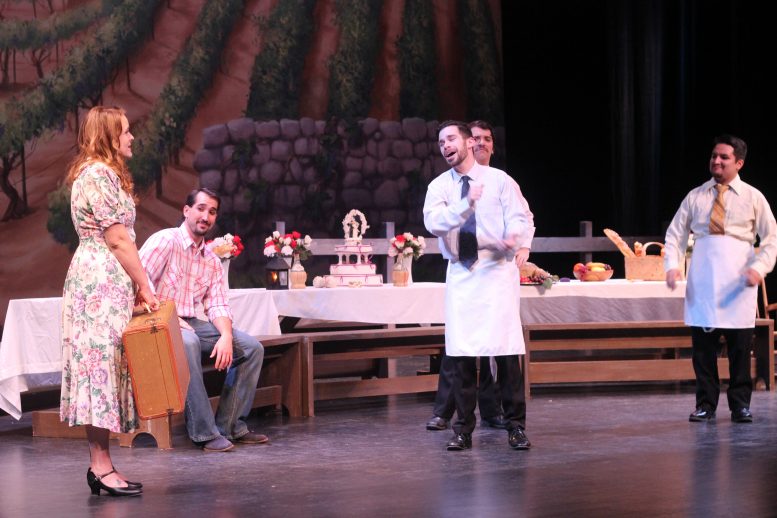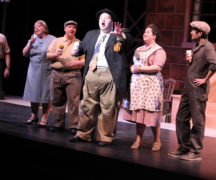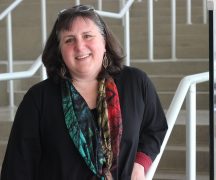By DAVID DUPONT
BG Independent News
Frank Loesser’s “The Most Happy Fella” is a tricky devil of a musical. Or is it an opera?
Loesser said it was a musical, and yet it is filled with soaring operatic moments to go along with the toe-tapping numbers.
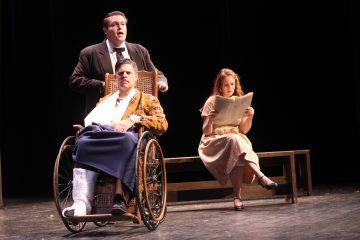
The Doctor (Salem Abad) urges Tony (Nick Kottman) to accept the care of Rosabella (Caroline Kouma) in the song “Love and Kindness.”
The Bowling Green Opera Theatre has the talent to do justice to both genres. That will be on display this weekend when “The Most Happy Fella” is performed Friday, Nov. 2 at 8 p.m. and Sunday, Nov. 4 at 3 p.m. in Kobacker Hall in the Moore Musical Arts Center at Bowling Green State University. For tickets click here.
Directed by Geoffrey Stephenson, the musical compresses the original three acts into two with the elimination of dance numbers. That puts the focus even more on the singing, and the cast comes through, which is no surprise to anyone who follows the sounds emanating from the College of Musical Arts.
Leading the cast are Caroline Kouma as Rosabella and Nick Kottman as Tony. They are an unlikely pair of lovers. The elderly vineyard owner sees her waiting table in a restaurant in San Francisco and falls in love. He leaves a note and keepsake indicating he’d like to develop a relationship.
They correspond, and when she asks for a photo he’s afraid she’ll reject him because of his age, instead he sends a photo of the handsome itinerant foreman Joe (Luke Serrano).
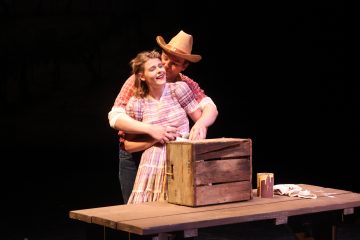
Cleo (Madi Short) and Herman (Luke Schmidt).
And when Rosabella — the name given her by Tony — finally arrives at the Napa Valley vineyard, she finds the wedding feast all spread out and Joe waiting for her. Only then do Joe and Rosabella discover the deception. But not before a couple of the exuberant production numbers that make the show so enjoyable. This leads up the revelation that takes both Joe and Rosabella by surprised. She’s about to leave, despite Joe’s protestations that Tony may be a “grampa,” he’s a nice guy as shown by all his friends gathered to greet his bride.
Then Tony arrives, on a stretcher, after his truck overturned. Knowing she has few options in life, Rosabella goes through what may be a deathbed wedding anyway, only to follow it up with an intimate indiscretion with Joe. Rosabella is at a loss and Joe only wants to help, yet they are carried away on waves of emotional confusion.
Now in most musicals the old guy, would be the barrier to overcome for the young lovers to be reunited.
But “Most Happy Fella” is not just any musical, and not just because of its lush, romantic score.
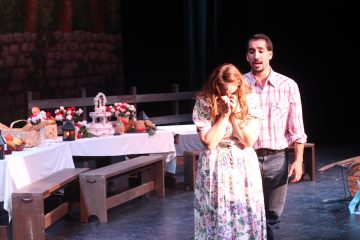
Joe (Luke Serrano) comforts Rosabella (Caroline Kouma) in “Don’t Cry.”
With the mediation of the doctor (Salem Abad) Tony and Rosabella grow closer, as she helps nurse him.
Kottman has to negotiate between his character’s impatience with the rate of his healing, and his genuinely generous spirit.
He’s nagged by concerns, fueled by his jealous dour sister Marie (Alexandra Hegedus), that he is too old for Rosabella.
He sends for her waitress friend from San Francisco, Cleo (Madi Short) giving her job so she can keep Rosabella company. She finds her own love interest in Herman (Luke Schmidt), the guy who likes everybody and gets taken advantage of as a result.
Schmidt and Short have a wonderful chemistry. Their comic interplay lights up the stage.
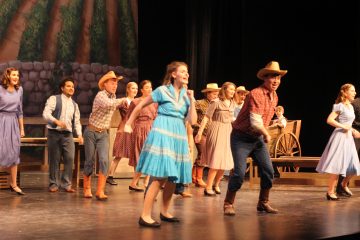
Cleo (Madi Short) and Herman (Luke Schmidt) lead a dance.
Kouma lets Rosabella’s affection for Tony evolve from admitting that she feels warmer when she’s near him to her expressing desire for physical passion, rather than the more paternal love Tony shows. A lovely switch from the old guy as lecher and the heroine as virginal naif.
All this plays out in melody. The dialogue serves as minimal transition to ardent song. The performers enunciate clearly even as they fill out the melodies with gorgeous tones. The two-piano accompaniment by Nate Leonard and Kevin Bylsma is orchestral.
In another twist on the usual Broadway practice, there is no real villains here, we want happily-ever-afters for all of them. The chorus serves as the audience stand-in. They really just want a party. The audience wants to be entertained as well, and they are, in a deeply, authentic way.

